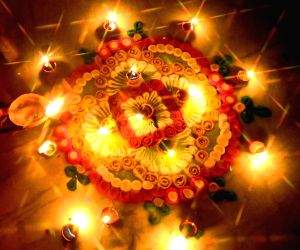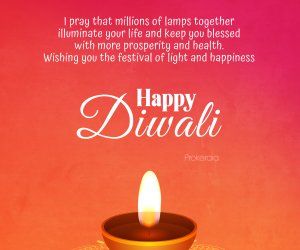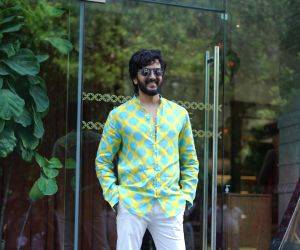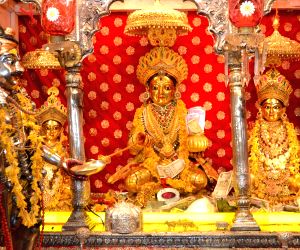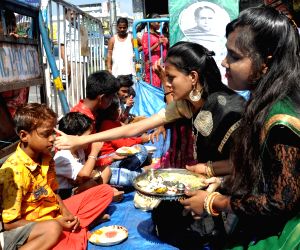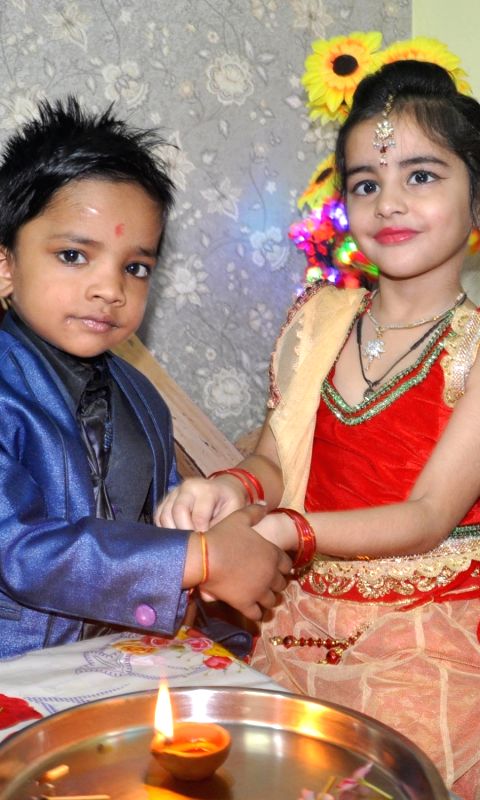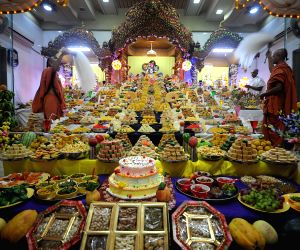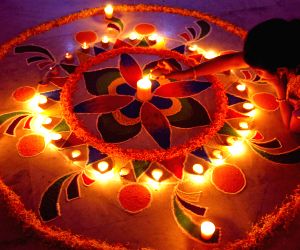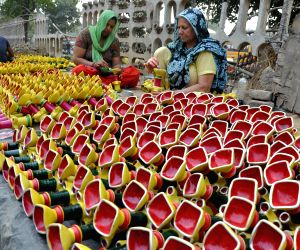Diwali 2024: Puja timings, Rituals, Dates & Muhurat of 5 Days of Diwali

Women decorating Rangoli with colours and earthen lights on the eve of Diwali festival. Diwali 2024 is on November 01, Friday
Diwali, the Hindu festival of lights, is India's most awaited and brightest of all festivals. Diwali is a shortened form of the original word "Deepavali," which originates from the words "Deepa," signifying lamp or lantern, and "Aavali," referring to a series or rows. It is celebrated throughout the world, transcending religious and socio-cultural boundaries as a joyous reminder of the power of light over darkness, the victory of good over evil, and knowledge over ignorance. Diwali festival comes somewhere around late October to mid-November every year.
When is Diwali?
On the Hindu lunar calendar, the festival of Diwali falls on Kartik amavasya or the new moon of Kartik month. In India, especially northern states, Diwali is a five day long celebration that commences with Dhanteras on the 13th lunar day of the Krishna paksha (waning phase) of Kartik month. It ends with the celebration of Bhai Dooj that falls on the 17th lunar day of the Shukla paksha (waxing phase) of the same month as per the Purnimanta calendar. In 2024, North India and South India will celebrate Deepavali on the same day.

A woman arranging earthen lamps around a 'rangoli' during Diwali celebration
Diwali 2024 is on November 01, Friday
6 months and 1 day to go for the event
Karthik Amavasya Tithi Timing: October 31, 3:53 pm - November 01, 6:17 pm
Pradosh puja time : November 01, 05:44 PM - 08:19 PM
What are the Diwali dates in 2024?
2024 Diwali celebration starts with Dhanteras on October 29, 2024 Tuesday and ends with Bhai Dooj on November 03, 2024 Sunday. Lakshmi Puja, the most auspicious of diwali festival days is celebrated as the day of Diwali. Hence, Diwali 2024 falls on Friday, November 01.

Women decorate a rangoli with earthen lamps on the occasion of Diwali festival
Diwali Calendar 2024 - The 5 days of Diwali 2024
| Day 1 | Dhanteras | October 29, Tuesday |
| Day 2 | Naraka Chaturdasi (Chotti Diwali) | October 31, Thursday |
| Day 3 | Lakshmi Puja (Diwali Festival) | November 01, Friday |
| Day 4 | Govardhan Puja | November 02, Saturday |
| Day 5 | Bhai Dooj | November 03, Sunday |

People light diyas on the ocassion of diwali festival in Ayodhya
Diwali illuminates our houses and hearts and preaches the message of friendship and togetherness. Light is the depiction of hope, success, knowledge and fortune and Diwali reinforces our faith in these virtues of life.
Diwali 2024 Shubh Muhurat and Amavasya Tithi Timings
| Sunrise | November 01, 06:36 AM. |
| Sunset | November 01, 05:44 PM. |
| Amavasya Tithi Timing | October 31, 03:53 PM - November 01, 06:17 PM |
| Pradosha Puja Time | November 01, 05:44 PM - 08:19 PM |
| Nishita Kaal Time | November 01, 11:44 PM - November 02, 12:36 AM |
| Place : Ujjain [ India ] See More | |

A woman gives final touches to Rangoli on the occasion of Diwali festival
The Story behind Diwali
Since Diwali is the resemblance of everything that is 'good', this festival has been the centre of many mythological stories.
Lord Rama returned to Ayodha on this day along with sita and Lakshman after he attained victory over Ravana, the ten headed demon king of Lanka. On this occasion, the local people lit earthen lamps and burst crackers to welcome their King and queen back to the throne.
This day is also celebrated as the union of Goddess Lakshmi and Lord Vishnu in heaven.
In Bengal, this day is celebrated to worship the most powerful Goddess of 'shakti' - Devi Kali.
In the Jain culture, this day is of utmost importance as Mahavira attained the final 'nirvana' on this day.
In ancient India, this day was celebrated as the harvest festival.
Diwali also marks the death anniversary of Dayanand Saraswati, the 'hero' of the Arya Samaj.

Rituals of Diwali
Diwali is celebrated all across India in different forms and is thus an important National holiday too.
Diwali starts with Dhanteras the beginning of a new financial year, the second day is Naraka Chaturdasi, the day Lord Krishna killed the demon Narakasura; the third day is Amavasya, the day Goddess Lakshmi , the deity of wealth and fortune is worshipped.
The fourth day is Govardhan Puja and the last day is celebrated as Bhai Dooj , the day sisters worship their brothers and pray for their long life and well being.
Feasting, gambling, exchanging gifts among friends and families and bursting fire crackers are a must during Diwali. People also wear new clothes and worship Goddess Lakshmi and Lord Ganesha on this day. This day is dedicated for the Special Lakshmi Puja.
In Southern India, Diwali marks the home coming of their ancient King Mahabali and people decorate their houses with flowers and cow dung to welcome the King. Govardhan Puja is done on this day.
In Bengal and other parts of Eastern India, Goddess Kali is worshipped on this day. This is known as Shyama puja.
In Maharashtra, Diwali starts with the worshipping of cows and their calves. This is known as Vasu baras.
Big Diwali fairs are held across the country. These fairs are centers of business and many artists and acrobats are seen performing in these events.
FAQs
-
- What is Diwali in short?
-
- Diwali, commonly referred to as the Festival of Lights, is a significant day when adherents of Hinduism, Jainism, and Sikhism illuminate earthen lamps known as Diyas or candles, ignite fireworks, exchange sweets, and create intricate Rangoli designs using coloured sand or chalk powder, all in jubilant commemoration of the triumph of Light over Darkness.
- What are the days of Diwali?
-
- Diwali is typically a five-day festival celebrated by Hindus and one of India's most significant festivals. The five days of Diwali are:
Dhanteras: The first day of Diwali is observed on the Kartik Krishna Paksha Trayodashi, falling on October 29, 2024 Tuesday. It involves cleaning and decorating homes and workplaces, shopping for new items, and performing prayers for prosperity.
Naraka Chaturdashi: The second day of Diwali is observed on Kartik Krishna Paksha Chaturdashi, falling on October 31, 2024 Thursday. On this day, people light oil lamps and create colourful Rangoli designs to celebrate the victory of Lord Krishna over the demon Narakasura, this day is also the day when goddess Kali defeated the demon called Raktabija, and is celebrated as Kali Chaudas.
Diwali: The festival's primary day is celebrated on Kartik Amavasya, falling on November 01, 2024 Friday. People light oil lamps, burst fireworks, exchange gifts, and offer prayers to Goddess Lakshmi for wealth and prosperity, which is why it is also called Lakshmi Puja.
Govardhan Puja: The fourth day of Diwali is observed on Kartik Shukla Paksha Pratipada, falling on November 02, 2024 Saturday. This day is dedicated to the worship of Lord Krishna and commemorates the lifting of the Govardhan Hill to protect the people from torrents of rain caused by Indra.
Bhai Dooj: The fifth and final day is observed on the Kartik Shukla Paksha Dwitiya, falling on November 03, 2024 Sunday. This festival is for celebrating the bond between brothers and sisters. Sisters perform aarti for their brothers and pray for their well-being.
- Diwali is typically a five-day festival celebrated by Hindus and one of India's most significant festivals. The five days of Diwali are:
-
- What is the Origin of Diwali?
-
- The origins of the Diwali can be traced back to the ancient India.
Hinduism: The most followed story of the Origin of Diwali is when Lord Rama, the seventh avatar of Lord Vishnu, returned to Ayodhya, his home. People lit up Diyas all over Ayodhya to celebrate the return and welcome their King Rama.
Sikhism: Within Sikh tradition, Diwali holds special significance as it marks the liberation of their sixth Guru, Guru Hargobind Singh, from the confines of Gwalior Fort's prison. Mughal ruler Jahangir, the son of Akbar, had imprisoned him following the execution of his father, Guru Arjan, to quell the Sikh resistance against the Mughal authority.
Jainism: According to the Jain culture, Diwali marks the day when Bhagavaan Mahaveer, the 24th Tirthankara of the current era, achieved Nirvana, transcending his earthly existence. Additionally, it is believed that Mahaveera's Ganadhara (disciple), Gautam Swami, attained Kevala Jnana (Omniscience) on this auspicious day.
- The origins of the Diwali can be traced back to the ancient India.
Diwali festival dates between 2020 & 2030
| Year | Date |
|---|---|
| 2020 | Saturday, 14th of November |
| 2021 | Thursday, 4th of November |
| 2022 | Monday, 24th of October |
| 2023 | Sunday, 12th of November |
| 2024 | Friday, 1st of November |
| 2025 | Tuesday, 21st of October |
| 2026 | Sunday, 8th of November |
| 2027 | Friday, 29th of October |
| 2028 | Tuesday, 17th of October |
| 2029 | Monday, 5th of November |
